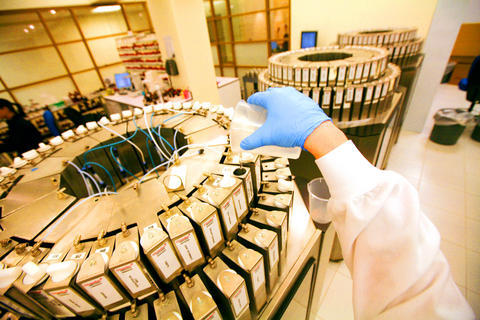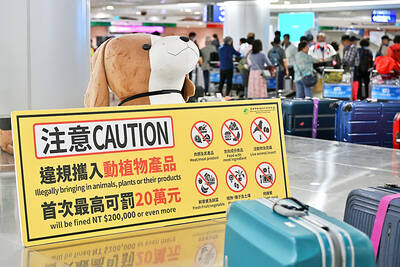Its scent is reminiscent of a mixture of a just-picked apple and a rose in its prime. But to Takasago International Corp, which manufactures this synthetic material, it smells even sweeter.
Last year, the chemical, whose trade name is Thesaron, became an essential ingredient in a new perfume, Silver Shadow Altitude, released by Davidoff.
Playing a role in one of the most successful international fragrance trade names -- Davidoff has had a scent on the top five perfume best-seller list for the last 20 years -- means that molecule is highly profitable for Takasago.

PHOTO: NY TIMES NEWS SERVICE
Thesaron is a perfume industry version of pharmaceuticals like Lipitor, the commercial name of the active ingredient developed by Pfizer that lowers blood cholesterol.
Drug companies have long made a lot of money by patenting new molecules.
Similarly, the scent makers -- Symrise of Holzminden, Germany; Givaudan of Geneva; International Flavors and Fragrances (IFF) of New York; and Takasago of Tokyo -- spend billions on research to find new smell molecules, patent them and sell them.
The innovative scents of these "captives," as the patented molecules are known, are crucial to enticing consumers to buy the 600 or so new perfumes introduced every year and appealing to buyers of other fragrant products like soaps and air fresheners.
Captives have other virtues as well. Jean Jacques, Takasago perfumer, put Thesaron in Altitude, for example, because it solved some problems: Thesaron has the fruity/rosy note of a very expensive class of molecules called rose ketones, but it costs far less. It can also be used in unlimited amounts, while rose ketones are restricted because they set off allergic reactions at high doses.
Ned Polan, a vice president for fragrance ingredient research at IFF, pointed out another quality of captives: they allow perfumers to recreate smells found in nature and create new, wholly unknown ones.
"There are no new colors to see and very few new sounds, but we are actually creating new, unique smells no one has ever smelled before," Polan said.
It is, quite literally, as if a paint company could make a new shade of blue.
Givaudan produces natural and synthetic perfumery raw materials and employs the perfumers who use these materials to make fragrances. In 2006 Givaudan's sales were 2.9 billion Swiss francs (US$2.64 billion), and the double-digit sales growth of its fine fragrances division -- which that year made perfumes for Yves Saint Laurent, Burberry, Tom Ford and Hugo Boss -- was powered by Givaudan's captives.
Givaudan began creating molecules in 1902.
"Our new molecule platform drives our innovation and takes up a most significant part of our R&D budget," said Kate Greene, vice president for marketing at Givaudan. "We have over 50 researchers dedicated to new captives."
As with other scent makers, Givaudan does not break out the share of its research devoted to creating captives, but the company's total research budget last year was 371 million Swiss francs.
Greene said Givaudan had become the leading producer of captives; its perfumers put the captive Amber Ketal in Aqua di Gio from Armani and Polo Blue from Ralph Lauren.
Each year, Givaudan's scientists develop over 2,000 new molecules.
After scent evaluation, synthesis studies and toxicity testing, "only three or four per year are selected for launch," Greene said.
But they are crucial.
Captives "provide newness to our perfumers' palettes," she said, "which in turn brings innovation to our clients' brands."
Takasago's captive Hindanol is in the scent it makes for Johnson & Johnson's self-tanning product Holiday Skin. It smells of sandalwood, but it can do what no natural sandalwood can.
Where the natural is heavy and used as a perfume's "base note" -- what the consumer only smells after the lighter molecules have diffused -- Hindanol is highly diffusive and thus can be used as a "top note," allowing the user to smell sandalwood where she would not have before.
"Captives give us performance and functional attributes in different applications like soap or detergents where you might need specific attributes," said Michael Popplewell, vice president for corporate research at IFF.
One example is a molecule that stays firmly on fabric, perfect for scenting laundry detergents.
Captives also bolster environmental conservation. A captive synthetic jasmine can smell stronger than its natural counterpart, so perfumers can use fewer chemicals to get the same power, which reduces both the company's costs and the amount of water needed to wash it away.
India's sandalwood forests have been so decimated, further harvesting has been banned. Also, captives do not require polluting fertilizers or cause farmers to deplete the soil.

UKRAINE, NVIDIA: The US leader said the subject of Russia’s war had come up ‘very strongly,’ while Jenson Huang was hoping that the conversation was good Chinese President Xi Jinping (習近平) and US President Donald Trump had differing takes following their meeting in Busan, South Korea, yesterday. Xi said that the two sides should complete follow-up work as soon as possible to deliver tangible results that would provide “peace of mind” to China, the US and the rest of the world, while Trump hailed the “great success” of the talks. The two discussed trade, including a deal to reduce tariffs slapped on China for its role in the fentanyl trade, as well as cooperation in ending the war in Ukraine, among other issues, but they did not mention

Japanese Prime Minister Sanae Takaichi yesterday lavished US President Donald Trump with praise and vows of a “golden age” of ties on his visit to Tokyo, before inking a deal with Washington aimed at securing critical minerals. Takaichi — Japan’s first female prime minister — pulled out all the stops for Trump in her opening test on the international stage and even announced that she would nominate him for a Nobel Peace Prize, the White House said. Trump has become increasingly focused on the Nobel since his return to power in January and claims to have ended several conflicts around the world,

REASSURANCE: The US said Taiwan’s interests would not be harmed during the talk and that it remains steadfast in its support for the nation, the foreign minister said US President Donald Trump on Friday said he would bring up Taiwan with Chinese President Xi Jinping (習近平) during a meeting on the sidelines of the APEC Summit in South Korea this week. “I will be talking about Taiwan [with Xi],” Trump told reporters before he departed for his trip to Asia, adding that he had “a lot of respect for Taiwan.” “We have a lot to talk about with President Xi, and he has a lot to talk about with us. I think we’ll have a good meeting,” Trump said. Taiwan has long been a contentious issue between the US and China.

Taiwan’s first African swine fever (ASF) case has been confirmed and would soon be reported to the World Organization for Animal Health (WOAH), Minister of Agriculture Chen Junne-jih (陳駿季) yesterday. The Ministry of Agriculture’s Veterinary Research Institute yesterday completed the analysis of samples collected on Tuesday from dead pigs at a hog farm in Taichung and found they were ASF-positive. Animal and Plant Health Inspection Agency Animal Quarantine Division chief Lin Nien-nung (林念農) said the result would be reported to the WOAH and Taiwan’s major trade partners would also be notified, adding that pork exports would be suspended. As of Friday, all samples